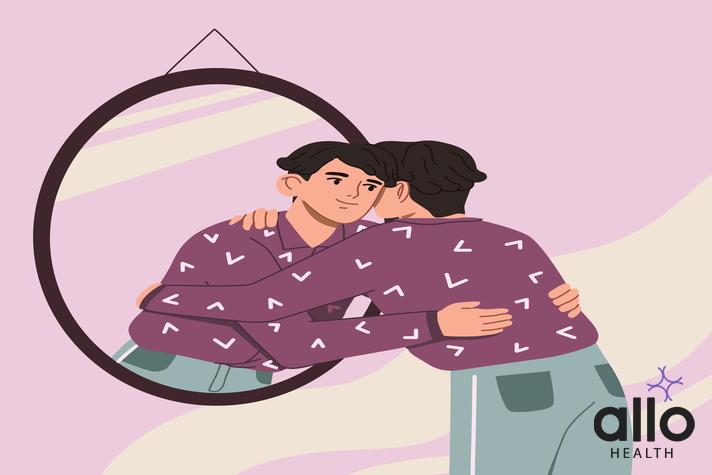Managing Gonorrhea: Coping and Psychological Support

Allo Health is dedicated to personalized well-being, offering support and trusted information tailored to individual health goals. The platform emphasizes human-generated content, led by a distinguished medical team of experts, including physicians and sexual health specialists. Their commitment to credibility involves rigorous fact-checking, authoritative research, and continuous updates to ensure accurate, up-to-date information. Allo Health's unique approach goes beyond conventional platforms, providing expert-led insights and a continuous commitment to excellence, with user feedback playing a crucial role in shaping the platform's authoritative voice.

Dr Sanina Mansoor holds MBBS degree from Yenepoya university,Mangalore.She has 8 years of experience working as a medical officer at various health centres and medical colleges.
Why This Was Upated?
Our experts continually monitor the health and wellness space, and we update our articles when new information became available.
Updated on 10 February, 2025
- Article was updated as part of our commitment to diversity, equity, and inclusion.
Gonorrhea, a sexually transmitted infection (STI), can present challenges beyond physical symptoms. Coping emotionally and receiving psychological support are crucial components of managing gonorrhea effectively. This article offers detailed guidance on coping strategies and the importance of psychological interventions for individuals diagnosed with gonorrhea.
Understanding Gonorrhea
Gonorrhea, caused by the bacterium Neisseria gonorrhoeae, can affect the genitals, rectum, and throat. Symptoms may include painful urination, abnormal discharge, and pelvic discomfort. However, some individuals may be asymptomatic, underscoring the importance of regular STI testing for early detection and treatment.
Medical Management
Treatment typically involves antibiotics prescribed by healthcare providers. To ensure effective management:
- Complete the Full Course: Finish the prescribed antibiotics even if symptoms subside.
- Attend Follow-Up Appointments: Confirm the infection’s eradication and address any complications.
- Notify Sexual Partners: Encourage partners to seek testing and treatment to prevent reinfection and further transmission.
Emotional Impact
Receiving a gonorrhea diagnosis can trigger various emotions, including:
- Shock: Surprise or disbelief at the diagnosis.
- Embarrassment: Feelings of shame or stigma associated with STIs.
- Fear: Concerns about health implications or the reaction of others.
- Anger: Frustration over the situation or perceived injustices.

Coping Strategies
- Educate Yourself: Gaining knowledge about gonorrhea can demystify the condition and alleviate anxiety. Seek information from reputable sources like healthcare providers, sexual health organizations, or reliable websites.
- Communicate Openly: Engage in open dialogue with healthcare providers to address concerns and receive clarity on treatment options. Effective communication fosters understanding and empowers individuals to make informed decisions about their health.
- Seek Support:
- Personal Support Network:
- Therapy or Counseling: Consider therapy sessions to navigate the emotional impact of a gonorrhea diagnosis. Therapists can provide coping strategies and tools to manage stress, anxiety, and relationship dynamics.
- Support Groups: Joining support groups, whether in-person or online, connects individuals with peers who share similar experiences. Sharing stories, receiving advice, and offering support within these communities can be invaluable.
- Personal Support Network:
- Professional Support:
- Friends and Family: Lean on trusted individuals for emotional support and understanding.
- Partner: Involve partners in the treatment process to foster mutual support and strengthen the relationship.
Practice Self-Compassion
Be kind to yourself and recognize that contracting an STI does not diminish your worth or identity. Practice self-care activities that promote mental and emotional well-being, such as mindfulness, relaxation techniques, or engaging in hobbies.
Stay Informed
Continuously educate yourself about gonorrhea, including prevention strategies, treatment advancements, and available resources. Being informed empowers individuals to advocate for their health and navigate the healthcare system effectively.
Psychological Support Interventions
Therapy:
- Individual Therapy:
- Cognitive-Behavioral Therapy (CBT): CBT techniques can help challenge negative thought patterns and develop coping mechanisms to manage anxiety and stress.
- Trauma-Informed Therapy: For individuals experiencing trauma or intense emotional distress, trauma-informed therapy provides a supportive environment for healing and processing emotions.
- Couples or Family Therapy:
- Relationship Enhancement: Therapy sessions can strengthen communication skills and enhance intimacy between partners.
- Education and Support: Couples or family therapy sessions offer an opportunity to learn about sexual health together and address concerns as a unit.

Support Groups:
In-Person and Online Communities:
-
- Peer Support: Interacting with others who understand the challenges of living with an STI can reduce feelings of isolation and foster a sense of belonging.
- Information Sharing: Support groups facilitate the exchange of knowledge, resources, and coping strategies among members.
Mindfulness and Stress Reduction

24x7 AI backed chatbot for all your sexual health related queries
- Mindfulness Practices:
- Mindful Meditation: Incorporate mindfulness meditation into daily routines to promote relaxation and emotional resilience.
- Yoga and Tai Chi: Physical practices like yoga or tai chi combine movement with mindfulness, reducing stress and improving overall well-being.
Stress Reduction Techniques:
- Deep Breathing Exercises: Practice deep breathing techniques to calm the nervous system and alleviate stress.
- Journaling: Expressing thoughts and emotions through journaling can provide therapeutic relief and promote self-reflection.
Moving Forward
Managing gonorrhea extends beyond medical treatment to encompass emotional well-being and psychological support. By employing coping strategies, seeking professional assistance, and engaging in supportive communities, individuals can navigate the challenges of gonorrhea diagnosis with resilience and empowerment. Remember, you are not alone, and support is available to help you through this journey towards healing and recovery.
The following blog article provides general information and insights on various topics. However, it is important to note that the information presented is not intended as professional advice in any specific field or area. The content of this blog is for general educational and informational purposes only.
Book consultation
The content should not be interpreted as endorsement, recommendation, or guarantee of any product, service, or information mentioned. Readers are solely responsible for the decisions and actions they take based on the information provided in this blog. It is essential to exercise individual judgment, critical thinking, and personal responsibility when applying or implementing any information or suggestions discussed in the blog.


